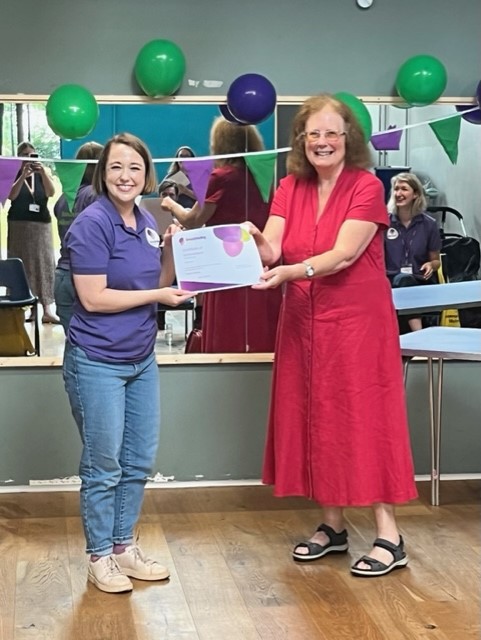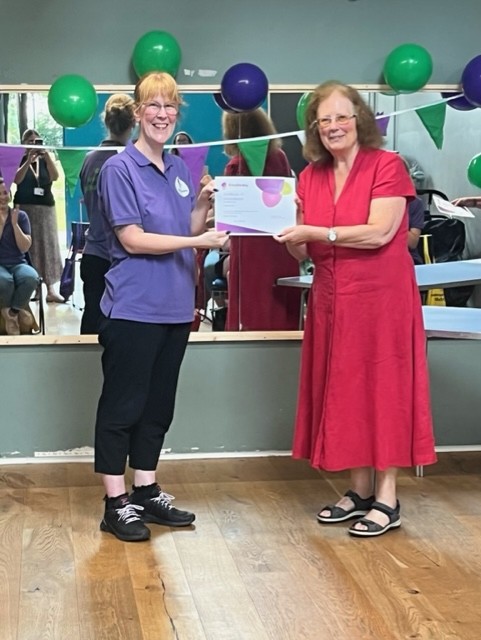As part of Volunteer’s Week 2024, we’re sharing stories from volunteer Helpers, Carly Karran and Stephanie Rees, on why they decided to train as Helpers for the Breastfeeding Network.
The BfN Helper Course (Peer Supporter) is a nationally recognised, Open College Network (London) accredited qualification. It’s our first level of training for volunteers – with the opportunity to continue training on the BfN Breastfeeding Supporter Course.
Our BfN Registered Helpers volunteer in a variety of different ways: BfN breastfeeding drop-in groups, in hospitals, schools, and antenatal classes.
These stories are from talks they both gave last autumn to celebrate qualifying as Helpers for Cardiff and Vale.
Carly’s Story

My breastfeeding journey has been really special. It’s been my mum superpower, my “parental Swiss army knife” (Emma Picket IBCLC) if you will. Using my body felt like an especially magic way to nurture my boy emotionally and physically, and I’m so proud to know the benefits of breastfeeding will last him and me a lifetime.
I’ve relieved his teething pain, calmed him while he’s been fractious, I’ve helped him back to sleep when he wouldn’t have otherwise been able to. I’ve been able to nurse him when he wouldn’t eat anything through sickness, and given his immune system the optimum start. I’ve been able to plug any nutrition holes during those fussy phases and help regulate him emotionally when his feelings were just too big.
From the moment I learned, sitting in the antenatal clinic, the benefits of breastfeeding and therefore the risks of not, I was hooked. That was it; I was going to be a breastfeeding mother. The feelings ran deep. It became my maternal identity and I couldn’t bear the idea of failing.
But the reality of establishing breastfeeding postpartum was very different from how I thought it would go. There was pain, so much pain, for so long. My baby cried with hunger pains, I cried. I felt like a failure as a mother, and I felt something akin to grief as breastfeeding was not like the fantasies I had in the hospital waiting rooms.
In a Covid-19 world, already limited support disappeared, and the realisation of why so many gave up became obvious. I had one Irish friend who breastfed – she helped but I felt the sea between us. My fantastic but over-stretched midwife disappeared after day 21. My well-meaning health visitors quoted latch, latch, latch.
But mastitis kept coming, I was unlucky they said. “No, thrush is rare, it’s a latch issue. Well done for getting to six weeks, and enduring all this pain. Most people give up by now if they’ve had such a bad start.” I needed the right support and quick. Thank goodness for Felicity and a breastfeeding pharmacist who saved our journey.
Standing here today, it’s clear I’m far from alone in my troubled start.
As my journey has progressed, some wider problems have become clear. As Lucy Webber IBCLC recently put it, we hear “It shouldn’t hurt but make sure you buy cream for your cracked nipples” or “Oh it’s normal to feed frequently but they’re feeding too much, you must not be making enough milk, give them formula”.
This list goes on. With all this unclear information we’re bombarded with, it’s no wonder we’re all confused. To quote Professor Amy Brown, “The reason so many women feel so overwhelmed in the first place is because they do not have support circles around them.”
From infant feeding surveys, we know around 80% of women who stop breastfeeding in the first six weeks do not want to. They want to keep breastfeeding but they feel that they can’t through pain, lack of support, or embarrassment. I’ve seen how traumatic this can be through friends who planned to breastfeed, whose image of motherhood was so innately wrapped around breastfeeding their baby, and how the pain of not being able to left them grieving.
For many, myself included, I agree with Professor Amy when she says “Accepting that this natural feeling matters to so many mothers is important”.
I feel so privileged to be equipped to help others. I’m so grateful that the Breastfeeding Network has given me the opportunity to help, to change the status quo, one mum at a time. I hope to help normalise breastfeeding and normal infant behaviours, to advocate for a mother’s desire to reach their breastfeeding goals, and dispel misinformation around breastfeeding.
I think getting to chat to an experienced breastfeeding mother could also be far easier for some people than speaking to health professionals. I think we could also help new mothers, at a vulnerable and somewhat lonely time of their lives, perhaps feel less alone. It’s not all altruistic of course; I also want to help others so in turn I can help myself to feel good, and to enjoy being a positive segment in other peoples’ day.
Like many mothers through the newborn struggle, it was something I nearly gave up on but I would have lived in regret. I relish getting the opportunity to make a difference to mothers, who need non-judgemental, knowledgeable, and compassionate support to continue on their breastfeeding journey or feeding goals.
Stephanie’s Story

Never thought I would do it another way… Maybe the rigid thinking of being neurodiverse. Plenty of people I knew formula-fed. But knowing my mum, nanna, sister, and cousins all breastfed, I was even more focused on doing it.
I was lucky. Not because it came easily or naturally to me, but because I won the postcode lottery in terms of breastfeeding support.
Having my first, my now nearly 8-year-old Thea, we were living in Bristol. Breastfeeding support was so available and people in general whapped them out wherever to feed.
Then came the time to visit home, a bus, a train, and then the number 45 back to St Mellon’s in Cardiff. Of all the places I had fed Thea, this bus panicked me the most.
I had never seen anyone local feeding. I’m sure now there were, but not visibly.
I started to panic. Thea was high needs, fed every 45 minutes – refused a bottle. It was going to happen. I had a bottle of expressed milk on me – laughable that I even tried – she refused it. By this point, screaming had ensued. I whapped out the boob, banged it in. Silence. Then a little old lady-, sat across from me, shimmied over and said, “Best thing in the world!’
All my fears went.
Visibility and access are everything.
Times have changed.
Seven and a half years on, I’m back living in St Mellon’s running a free stay and play – and people are breastfeeding, not just infants, but toddlers and pre-schoolers. Teens through to older parents whapping them out.
It’s huge to me, but there still wasn’t enough support for them. The amount of mums I’ve spoken to at the stay-and-play who have said I just couldn’t. “I didn’t know who to ask”, “I couldn’t get to a group because it was too far away”, or “It was Covid”.
Where I live in Cardiff is an area of socio-economic deprivation. In the top five of Wales. The data shows that parents in this demographic are still the least likely to continue to breastfeed.
Visibility and accessible support absolutely play a part in this. So, knowing that breastfeeding is so important to our children’s health, knowing I already had the venue and community onside and that I love a bit of science, I applied to be a BFN Helper. A massive deal!
I’d been on the mailing list for training for a couple of years and finally Wales and Cardiff came up! Now here I am, accepting my qualification certificate alongside a bunch of warrior women. With the support group in St Mellon’s launching on Thursday morning. It’s pretty wicked to be fair!
We’re so proud of our volunteers here at the Breastfeeding Network. Without their hard work and dedication, BfN wouldn’t be what it is today!

